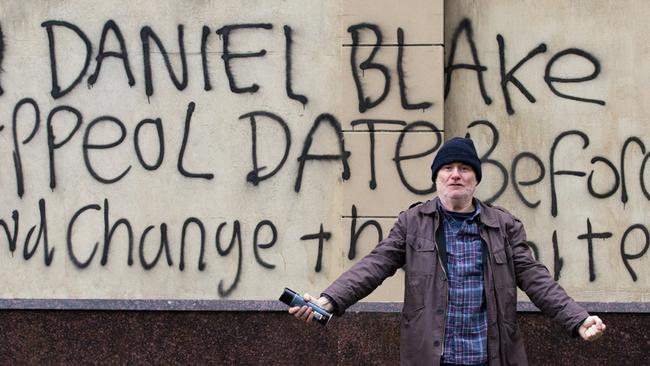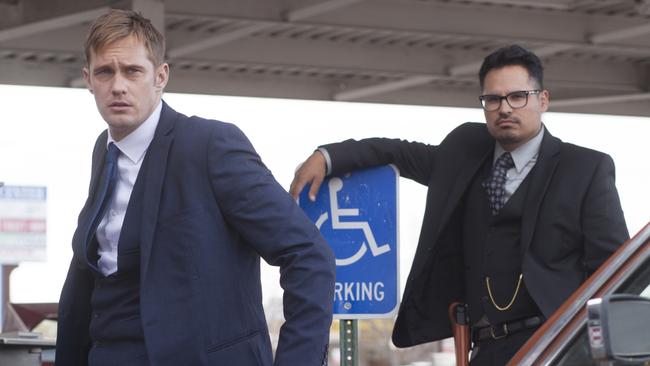Film reviews: Ken Loach’s I, Daniel Blake; War on Everyone
British director Ken Loach has spent his career championing the rights of those who live on struggle street.

British director Ken Loach turned 80 this year, a few weeks after his latest film, I, Daniel Blake, was awarded one of cinema’s most prestigious annual prizes, the Palme d’Or of the Cannes film festival; the Cannes jury, headed by our own George Miller, singled out Loach’s film over a strong international line-up of diverse films, giving Loach the award for the second time. (He also won for The Wind that Shakes the Barley in 2006.) A few weeks ago the film opened in Britain and, to the surprise of many, became commercially the most successful of the 26 features Loach has made during a career spanning more than 50 years.
Loach, who was born and raised in the Midlands, was one of the British directors who emerged in the 1960s after cutting their teeth on BBC television drama (Ken Russell and John Boorman were among the others). Loach’s 1966 drama Cathy Come Home was a revelation in its day as it unflinchingly depicted the plight of a young wife and mother who becomes homeless after her husband is involved in a work-related accident. The “play”, actually shot on film, was clearly the work of someone angered at injustice, and it’s fair to say Loach has lost none of his anger in the intervening half-century. All of the director’s films share his passionate empathy for life’s battlers, for the “ordinary” men and women who are just trying to survive in a world that makes survival difficult.
I, Daniel Blake is firmly in that tradition. The eponymous Dan Blake (Dave Johns) lives in Newcastle upon Tyne and has worked all his life as a carpenter and joiner, paying his taxes and enjoying a happy married life until the recent death of his wife, whom he still quietly mourns. When the film begins, Dan has suffered a heart attack severe enough for his GP to advise him to stop working, at least for the time being. And so, like thousands of others in his predicament, he’s forced to seek welfare. And, like so many others, he finds himself baffled and frustrated by the red tape and documentation required, by the endless recordings of Vivaldi as he waits for hours on the phone for someone to help him, or by the requirements to complete forms online, using technology with which he’s completely unfamiliar. For hour after hour he endures humiliation and condescension at the hands of some (not all) of the staff at the Jobseeker’s Allowance office.
Dan finds himself in a lose-lose situation. His doctor says he can’t work; the bureaucracy says he must, or at least must prove he’s seeking work, if he’s to receive welfare payments. Meanwhile, because he’s a kind, decent, friendly man, he finds himself involved with Katie (Hayley Squires), a single mum with two children, who recently has been moved from London, where her mother and support group live, to this unfamiliar city in the north of England because no state housing was available in or near the nation’s capital. As a stranger in town, Katie has taken the wrong bus to the welfare office and consequently is late for her first appointment, which means she’s denied access to any payment until the next appointment, no matter that she has kids to feed and no money to heat the ice-cold house she’s living in.
The film’s credits note that anonymous contributions to Paul Laverty’s screenplay were made by welfare agency employees, which no doubt is why so much of the film feels authentic. Loach is working here in the great tradition of screen realism; postwar Italian films such as Bicycle Thieves and Umberto D are the direct forebears of this depiction of life in contemporary Britain. Unlike Vittorio De Sica, who made those two masterpieces, Loach has been consistent throughout his career in his celebration of the underdog and his criticism of the powerful. It could be argued that his approach is manipulative; Dan is almost too good to be true, a surrogate father to Katie and her kids (and handy around the house) and a good neighbour to his black mate, despite the fact he seems to be involved in some dodgy dealings involving Chinese rip-offs of brand-name trainers. But for Loach, Dan represents the noble spirit of the working class, a good citizen all his life who now, in his hour of need, is being screwed by the system. Loach is palpably angry about what’s happening to the Dans and Katies of this world, and his anger spills out into every frame of the film.
One of the key scenes takes place where a charity, presumably a religious one, is handing out free groceries and other essentials to people such as Katie who have nothing. The volunteers here are kind and thoughtful, but even they aren’t prepared for the shocking moment when the starving young mother, who until now has fed her kids and not herself, rips open a can of cold baked beans and starts wolfing them down, swallowing her pride because her need is so great. That, says Loach, is the reality of poverty in Britain today.
You don’t go to a Loach film to see a cinematic spectacle. His films are shot in a functional and efficient style that perfectly fits the subject matter. But neither are you necessarily going to experience something unrelentingly grim. A bleak sense of humour permeates these inhabitants of struggle street, but though you can smile at the inane questions fired at welfare applicants by hidebound bureaucrats the underlying truth is both painful and universal. The director uses professional actors (Johns is known in Britain as a comedian) alongside non-professional actors who are essentially playing themselves, and it works brilliantly.
People such as Dan and Katie are usually just statistics: by allowing us to get to know the reality, humanity and heartbreak behind these statistics, Loach has made one of his finest films.

The first two features made by John Michael McDonagh, The Guard and Calvary, were set in Ireland and succeeded in combining suspense and humour to great effect. His third feature, War on Everyone, is set in New Mexico, with an unexpected side trip to Iceland, and is a Tarantino-esque cop thriller of little distinction.
Michael Pena and Alexander Skarsgard play maverick cops, the former a chubby family man, the latter a womanising hunk. Despite their differences they share a loose attitude towards their roles as law enforcement officers, breaking traffic rules and doing drugs while bickering and referencing popular culture in ways that are supposed to be funny.
With a soundtrack of Glen Campbell songs and a rather retro look, the film barrels along from one violent encounter to another without inviting much audience involvement.
I, Daniel Blake (MA15+)
4.5 stars
Limited release
War on Everyone (MA15+)
2.5 stars
National release




To join the conversation, please log in. Don't have an account? Register
Join the conversation, you are commenting as Logout